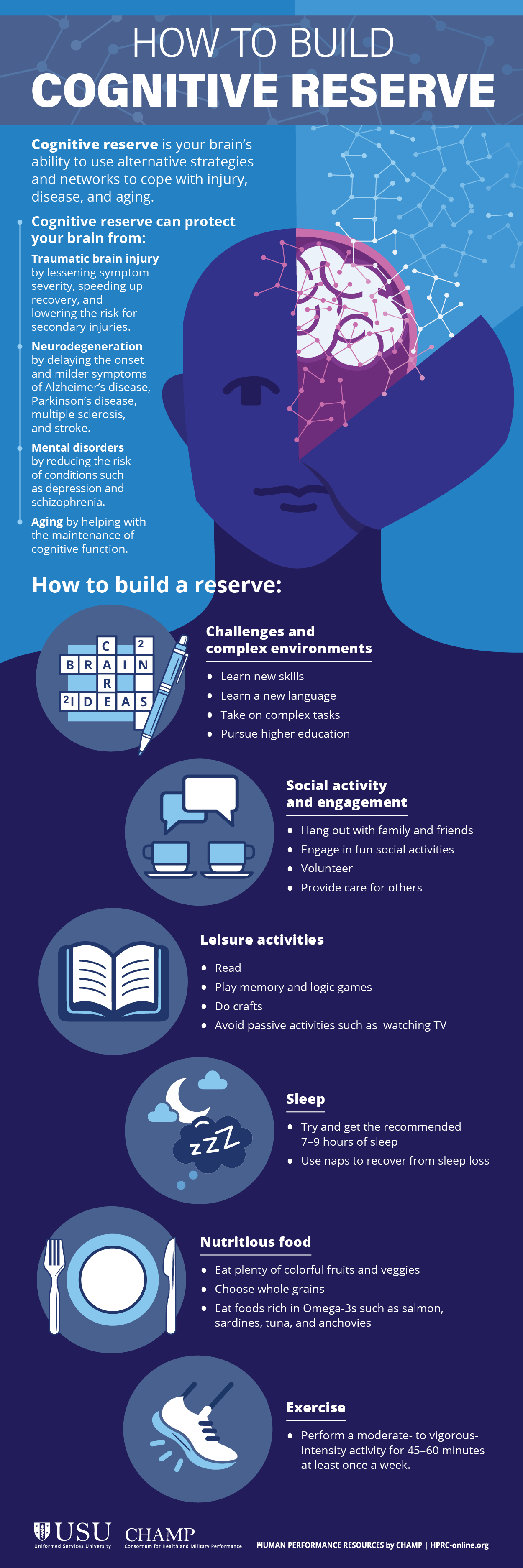You can build a “reserve” that helps your brain withstand injury, disease, and the natural effects of aging. This protective buffer is known as cognitive reserve. It helps your brain to maintain optimal function by using alternative pathways or networks when the original ones are compromised. Many activities you perform throughout your lifetime can help you build your cognitive reserve. And, it's never too late to adopt habits that continue to build your cognitive reserve.
This infographic sums up how cognitive reserve can protect your brain and lists some strategies to help you build your cognitive reserve. If you want to learn more about this topic, check out the "Cognitive reserve: What it is and how to build yours" article on HPRC.org.

Your brain can build a reserve to withstand injury, disease, and aging.
- Brain reserve is your brain's physical characteristics. Its size, number of neurons, and connections between neurons that provide a buffer against damage and aging
- Cognitive reserve is your brain's ability to use alternative strategies and networks to cope with damage and aging.
Cognitive reserve can protect your brain from:
- Traumatic brain injury by lessening symptom severity, speeding up recovery, and lowering the risk for secondary injuries.
- Neurodegeneration by delaying the onset and milder symptoms of Alzheimer's disease, Parkinson's disease, multiple sclerosis, and stroke.
- Mental disorders by reducing the risk of conditions such as depression and schizophrenia.
- Aging by helping with the maintenance of cognitive function.
How to build cognitive reserve.
- Challenges and complex environments
- Learn new skills
- Learn a new language
- Take on complex tasks
- Pursue higher education
- Social activity and engagement
- Hang out with family and friends
- Engage in fun social activities
- Volunteer
- Provide care for others
- Leisure activities
- Read
- Play memory and logic games
- Do crafts
- Avoid passive activities such as watching TV and scrolling social media
- Sleep
- Try and get the recommended 7–9 hours of sleep
- Use naps to recover from sleep loss
- Nutritious food
- Eat plenty of colorful fruits and veggies
- Choose whole grains
- Get your fats from nuts, seeds, olive oil, and fish
- Exercise
- Perform a moderate- to vigorous-intensity activity for 45–60 minutes at least once a week.
Published on: November 22, 2024
References
Arida, R. M., & Teixeira-Machado, L. (2021). The contribution of physical exercise to brain resilience. Frontiers in Behavioral Neuroscience, 14. doi:10.3389/fnbeh.2020.626769
Berkman, L. F., Glass, T., Brissette, I., & Seeman, T. E. (2000). From social integration to health: Durkheim in the new millennium. Social Science & Medicine, 51(6), 843–857. doi:10.1016/s0277-9536(00)00065-4
Bhat, A. (2015). Unraveling the mystery of cognitive reserve. Journal of Biosciences, 40(2), 205–208. doi:10.1007/s12038-015-9511-y
Ekdahl, N., Möller, M. C., Deboussard, C. N., Stålnacke, B., Lannsjö, M., & Nordin, L. E. (2023). Investigating cognitive reserve, symptom resolution and brain connectivity in mild traumatic brain injury. BMC Neurology, 23(1). doi:10.1186/s12883-023-03509-8
Evans, I. E. M., Martyr, A., Collins, R. L., Brayne, C., Clare, L., Anstey, K., & Peters, R. (2019). Social isolation and cognitive function in later life: A systematic review and meta-analysis. Journal of Alzheimer's Disease, 70(s1), S119–S144. doi:10.3233/jad-180501
Faubion, S. S. (2022). Brain-building: How to grow your cognitive reserve. from https://mcpress.mayoclinic.org/healthy-brain/brain-building-how-to-grow-your-cognitive-reserve/
Fraser, E. E., Downing, M. G., Biernacki, K., McKenzie, D. P., & Ponsford, J. L. (2019). Cognitive reserve and age predict cognitive recovery after mild to severe traumatic brain injury. Journal of Neurotrauma, 36(19), 2753–2761. doi:10.1089/neu.2019.6430
Geda, Y. E., Topazian, H. M., Lewis, R. A., Roberts, R. O., Knopman, D. S., Pankratz, V. S., . . . Petersen, R. C. (2011). Engaging in cognitive activities, aging, and mild cognitive impairment: A population-based study. The Journal of Neuropsychiatry and Clinical Neurosciences, 23(2), 149–154. doi:10.1176/jnp.23.2.jnp149
Ilut, S., Vadan, I., & Muresanu, D. (2022). The impact of cognitive reserve in the recovery of chronic encephalopathy associated with traumatic brain injury. Journal of Medicine and Life, 15(6), 723–726. doi:10.25122/jml-2022-1007
Katzman, R., Terry, R., DeTeresa, R., Brown, T., Davies, P., Fuld, P., . . . Peck, A. (2004). Clinical, pathological, and neurochemical changes in dementia: A subgroup with preserved mental status and numerous neocortical plaques. Annals of Neurology, 23(2), 138–144. doi:10.1002/ana.410230206
Kelly, M. E., Duff, H., Kelly, S., McHugh Power, J. E., Brennan, S., Lawlor, B. A., & Loughrey, D. G. (2017). The impact of social activities, social networks, social support and social relationships on the cognitive functioning of healthy older adults: a systematic review. Systematic Reviews, 6(1). doi:10.1186/s13643-017-0632-2
Leary, J. B., Kim, G. Y., Bradley, C. L., Hussain, U. Z., Sacco, M., Bernad, M., . . . Chan, L. (2018). The association of cognitive reserve in chronic-phase functional and neuropsychological outcomes following traumatic brain injury. Journal of Head Trauma Rehabilitation, 33(1), E28–E35. doi:10.1097/htr.0000000000000329
Maggi, S., Ticinesi, A., Limongi, F., Noale, M., & Ecarnot, F. (2023). The role of nutrition and the Mediterranean diet on the trajectories of cognitive decline. Experimental Gerontology, 173. doi:10.1016/j.exger.2023.112110
Manrique-Gutiérrez, G., Rodríguez-Cayetano, Q., Samudio-Cruz, M. A., & Carrillo-Mora, P. (2024). The role of cognitive reserve in traumatic brain injury: A systematic review of observational studies. Brain Injury, 38(1), 45–60. doi:10.1080/02699052.2024.2304876
Miller, B. L., Clare, L., Wu, Y. T., Teale, J. C., MacLeod, C., Matthews, F. E., . . . Woods, B. (2017). Potentially modifiable lifestyle factors, cognitive reserve, and cognitive function in later life: A cross-sectional study. PLoS Medicine, 14(3). doi:10.1371/journal.pmed.1002259
Oldenburg, C., Lundin, A., Edman, G., Nygren-de Boussard, C., & Bartfai, A. (2015). Cognitive reserve and persistent post-concussion symptoms—A prospective mild traumatic brain injury (mTBI) cohort study. Brain Injury, 30(2), 146–155. doi:10.3109/02699052.2015.1089598
Opdebeeck, C., Matthews, F. E., Wu, Y. T., Woods, R. T., Brayne, C., & Clare, L. (2017). Cognitive reserve as a moderator of the negative association between mood and cognition: evidence from a population-representative cohort. Psychological Medicine, 48(1), 61–71. doi:10.1017/s003329171700126x
Orchard, E. R., Rutherford, H. J. V., Holmes, A. J., & Jamadar, S. D. (2023). Matrescence: Lifetime impact of motherhood on cognition and the brain. Trends in Cognitive Sciences, 27(3), 302–316. doi:10.1016/j.tics.2022.12.002
Perry, B. L., Roth, A. R., Peng, S., Risacher, S. L., Saykin, A. J., Apostolova, L. G., & Schafer, M. (2022). Social networks and cognitive reserve: Network structure moderates the association between amygdalar volume and cognitive outcomes. The Journals of Gerontology: Series B, 77(8), 1490–1500. doi:10.1093/geronb/gbab192
Raza, Z., Hussain, S. F., Ftouni, S., Spitz, G., Caplin, N., Foster, R. G., & Gomes, R. S. M. (2021). Dementia in military and veteran populations: A review of risk factors—traumatic brain injury, post-traumatic stress disorder, deployment, and sleep. Military Medical Research, 8(1). doi:10.1186/s40779-021-00346-z
Schneider, E. B., Sur, S., Raymont, V., Duckworth, J., Kowalski, R. G., Efron, D. T., . . . Stevens, R. D. (2014). Functional recovery after moderate/severe traumatic brain injury. Neurology, 82(18), 1636–1642. doi:10.1212/wnl.0000000000000379
Song, S., Stern, Y., & Gu, Y. (2022). Modifiable lifestyle factors and cognitive reserve: A systematic review of current evidence. Ageing Research Reviews, 74. doi:10.1016/j.arr.2021.101551
Stern, Y., Arenaza‐Urquijo, E. M., Bartrés‐Faz, D., Belleville, S., Cantilon, M., Chetelat, G., . . . Vuoksimaa, E. (2020). Whitepaper: Defining and investigating cognitive reserve, brain reserve, and brain maintenance. Alzheimer's & Dementia, 16(9), 1305–1311. doi:10.1016/j.jalz.2018.07.219
Steward, K. A., Kennedy, R., Novack, T. A., Crowe, M., Marson, D. C., & Triebel, K. L. (2018). The role of cognitive reserve in recovery from traumatic brain injury. Journal of Head Trauma Rehabilitation, 33(1), E18–E27. doi:10.1097/htr.0000000000000325
Zavecz, Z., Shah, V. D., Murillo, O. G., Vallat, R., Mander, B. A., Winer, J. R., . . . Walker, M. P. (2023). NREM sleep as a novel protective cognitive reserve factor in the face of Alzheimer's disease pathology. BMC Medicine, 21(1). doi:10.1186/s12916-023-02811-z
Zijlmans, J. L., Riemens, M. S., Vernooij, M. W., Ikram, M. A., & Luik, A. I. (2023). Sleep, 24-hour activity rhythms, and cognitive reserve: A population-based study. Journal of Alzheimer's Disease, 91(2), 663–672. doi:10.3233/jad-220714





